A downpour on Sunday, Oct. 13, in the Isale-Osun area of Osogbo, South West Nigeria, was an answer to the prayers of farmers. But not everyone was pleased.
As water filled the streets, Ibrahim Rashidat, a petty trader with a physical disability, tried to save her goods from being swept away. After 30 minutes, the heavy rainfall subsided. Like many other traders without a shop, Rashidat limped out of her uncomplicated house to display her groceries in a small tray. Despite the difficulty occasioned by her uneven legs, she’s been the sole provider for her family for over a decade.
Her husband, a taxi driver, hasn’t stepped out of their one-room apartment since 2013 due to a stroke. As Rashidat tried to give an account of her struggle to survive, her voice trembled, and tears flowed from her eyes.
“I cry every day because life has been so terrible for me,” she told HumAngle. “Since my husband was struck down by a stroke over ten years ago, the weight of responsibility rests solely on my shoulders, including caring for our five children. I cannot even afford the necessary drugs for him; we can only afford pain relief items.”
When HumAngle visited her, Rashidat had yet to decide what her children would eat for the day because she had not made any sales. According to her, the ₦1,500 ($0.92) made the day before could only get some wraps of pap, which they drank just before bedtime. She is worried that her children’s future hangs precariously in the balance.
While the eldest, a 23-year-old lady, toils as a housemaid, her first son struggles to complete his barbering apprenticeship due to a lack of funds. The remaining three, who rely entirely on their mother for sustenance, have also dropped out of school.
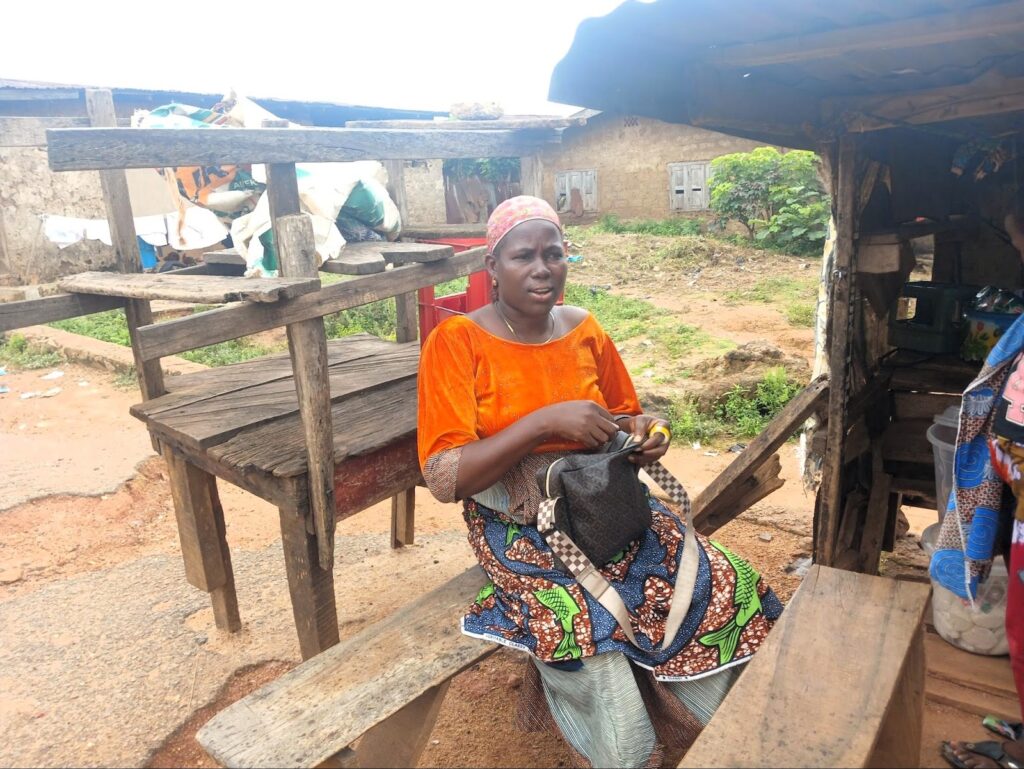
Rashidat’s daily routine often features begging and scavenging. Despite not being a widow, she attends widows’ meetings and churches to plead for charity.
“I see a lot of people mocking me and even exposing me at the meetings. They call me a liar and all sorts of names, but I have no choice because my condition is worse than that of many women who are truly widows,” she said between reddened eyes.
She started attending political meetings in her ward last year to find some excitement. However, a lot of men exploited her vulnerability. The grassroots politicians who promised her aid only ended up hurting her. She said one of them even offered her ₦1,000 ($0.6) after having sex with her.
“The painful thing was that I trekked a long distance to his place. Unfortunately, I couldn’t even take a commercial motorcycle with the money because it wasn’t enough to feed my children for the night. So, I had to trek back home.”
Rashidat revealed that she attempted suicide the previous Wednesday because of her frustration trying to feed her children.
“I was tired of telling them stories or allowing them to survive on pap alone,” she said. “I am the definition of abject poverty, and I may be forced to kill myself if my challenges persist. I’m only considering the little children I have; if not, I would have committed suicide long ago.”
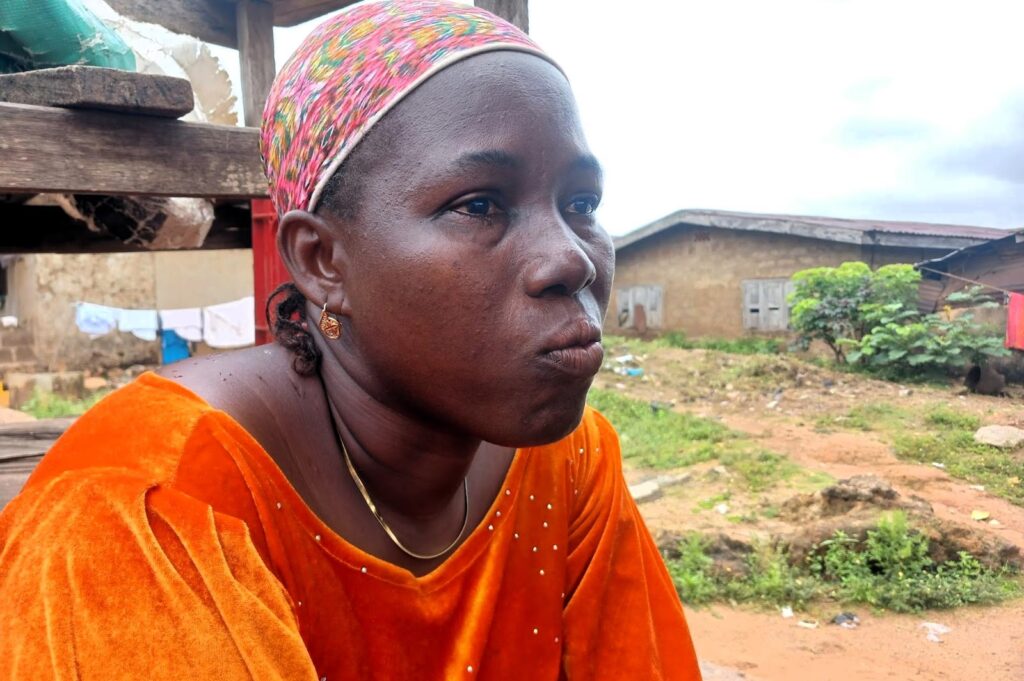
Poverty in Nigeria
The removal of fuel subsidies by Nigeria’s government led by President Bola Tinubu and the devaluation of the naira have increased poverty levels, especially among ordinary citizens and underprivileged members of society. The price of petrol has spiked in the last year, and a litre is now sold for over ₦1,000 ($0.6) in many parts of the country — a 400 per cent increase compared to the price before Tinubu was sworn in last year.
The development has negatively impacted the whole economy as more Nigerians have fallen into poverty and are struggling to survive. Though the government has approved a new minimum wage of ₦70,000 ($42.81) for civil servants, it has yet to implement it.
In rural communities, poverty is a multidimensional phenomenon as Nigerians like Rashidat lack access to basic needs like food, water, shelter, healthcare, and education.
According to the PwC Economic Outlook for 2024, poverty levels in Nigeria as of January are projected to increase to 38.8 per cent this year. The report shows that the low unemployment rate and low consumer purchasing power remain a problem amid the absence of a commensurate minimum wage increase to mitigate the economy’s inflationary growth.
The World Bank Group has also noted that an estimated 87 million Nigerians are living below the poverty line, making Nigeria “the world’s second-largest poor population after India”.
To combat poverty, successive governments have launched initiatives such as the National Social Investment Programme (NSIP), National Poverty Reduction with Growth Strategy (NPRGS), Conditional Cash Transfer (CCT) programme, N-Power job creation scheme, and so on. Still, these efforts have not produced significant results.
On the other hand, international organisations are providing support through the World Bank’s Nigeria Poverty Reduction and Economic Management Project and UNDP’s Nigeria Poverty Reduction Programme. Non-governmental organisations (NGOs) such as Oxfam, Save the Children, and ActionAid are also actively contributing to poverty reduction in the country.
Yet, the problem persists.
‘From hand to mouth’
For many years, Adefioye Silifat has sold akara (bean cake) in the Oja-oba market area of Osogbo, the capital of Osun state, but her economic fortune remains stagnant. She started the business in 2006, shortly after completing her secondary school education and losing both of her parents. Without financial support, she moved in with a bean cake seller, who became her guardian and mentor.
“I’ve been selling akara for more than a decade, but I haven’t seen any significant change in my life. I’ve been surviving from hand to mouth,” she said, her voice laced with frustration.
She explained that rising costs and shrinking profits have forced her family of five to “eat akara in the morning, afternoon and night” on days they don’t make enough sales. “When a bag of beans was ₦40,000 ($25), I could make over ₦100,000 turnover. But now, the prices have tripled, and my earnings haven’t improved.”
Silifat told HumAngle that while she makes an average of ₦12,000 ($7.4) daily, her family spends most of it (about ₦10,000) on meals — though when they skip lunch, it gets as low as ₦8,000. She sets aside ₦2,000 for a weekly contribution scheme to meet ends.
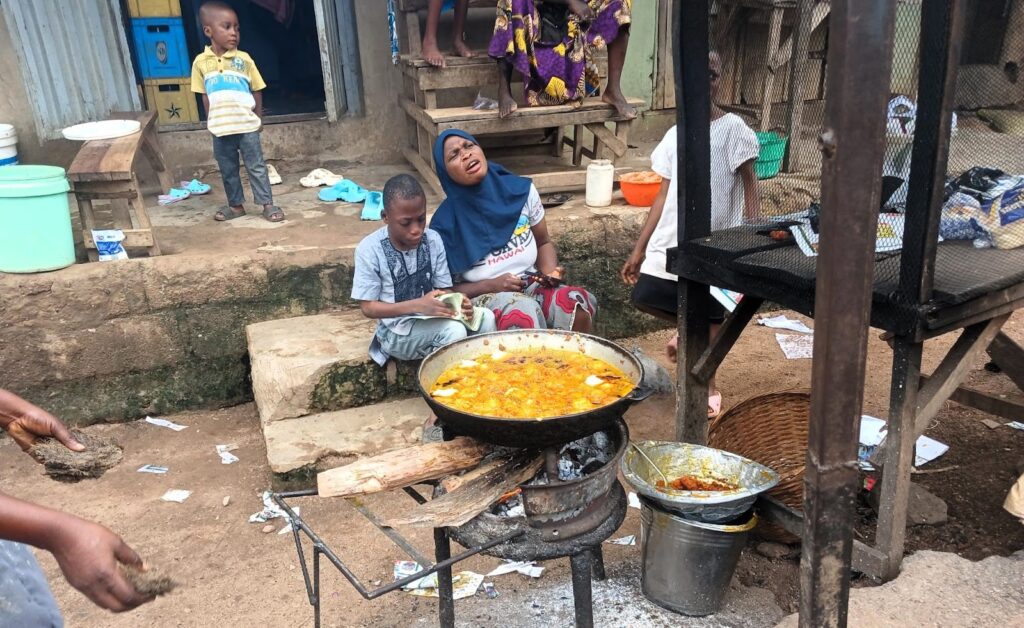
“It’s a struggle, but I’m better off than those doing labour jobs. I know people who eat just once a day,” she said, pointing HumAngle to Suleiman Kudirat, a woman in her mid-50s.
Sharing her heartbreaking story, Kudirat said life has been unbearable as a mother of three. Her husband, a vulcaniser, works tirelessly, too, but his income is barely enough. “We cannot even secure the future of our children because we are struggling to provide necessities like food and adequate shelter. The rising food and essential commodities costs have made survival a daily challenge.”
Kudirat’s children were sent home from school earlier this year due to unpaid fees. So, she started working at a construction site as a labourer. She’s since become an expert who is well-connected with bricklayers in Osogbo. As things become more difficult due to worsening economic conditions in Nigeria, one of Kudirat’s children has dropped out of school to work as a tiler.
“We want assistance,” she pleaded. “We need help and a chance to build a better life for our children.”
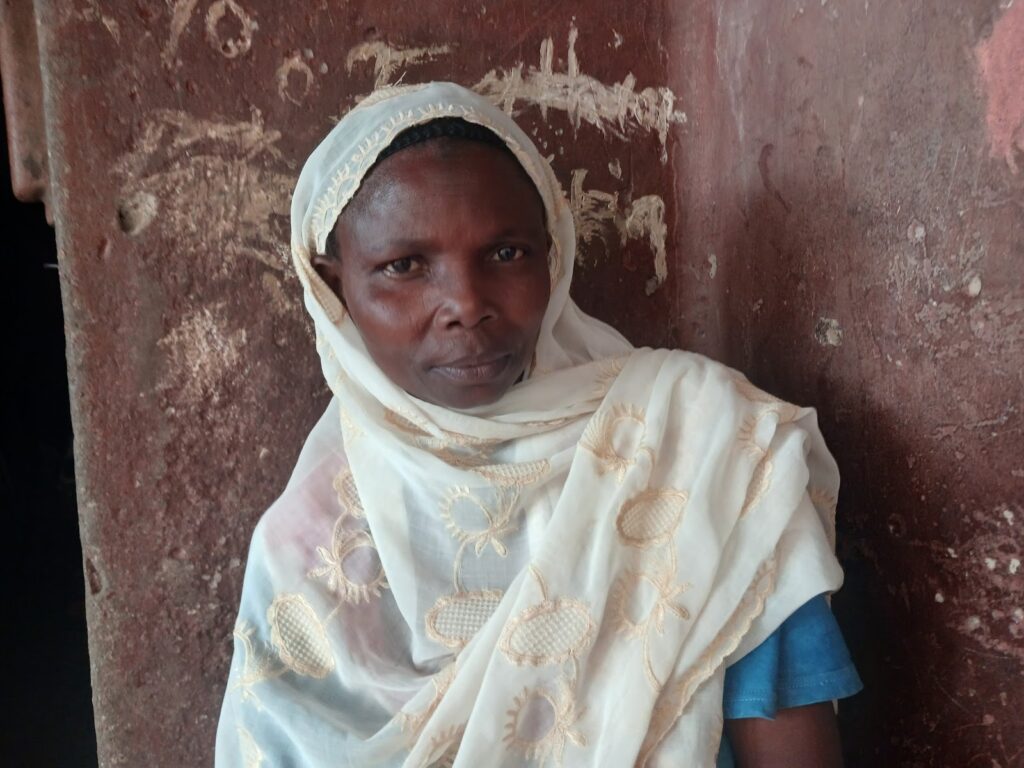
‘From success to struggle’
Before President Tinubu’s administration, Kasali Moriliat thrived as one of the top entrepreneurs in her community. But the current economic crisis in Nigeria has ravaged her business, leaving her deeply in debt. Her once bustling shop now lies idle.
“The hunger I currently experience is worse than during the Covid-19 era. I’ve been here since 6 a.m., but I haven’t made ₦2,000 as of 12 noon. The cost of living has skyrocketed, forcing me to abandon my gas stove for charcoal as gas now costs ₦1,350 per kg,” she said.
Though in her late 60s, Moriliat’s responsibilities extend beyond her survival. She’s also supporting her struggling children in raising their grandchildren, as she sometimes shoulders the weight of school fees and daily meals.
“Feeding the grandchildren in my custody alone costs ₦10,000 ($6) daily. Yet I hardly make that amount from my business. Cow skin has become our primary protein source, a far cry from the fish and meat we once enjoyed,” she added. “The government’s policies are not well thought out. They only throw millions of Nigerians into poverty.”
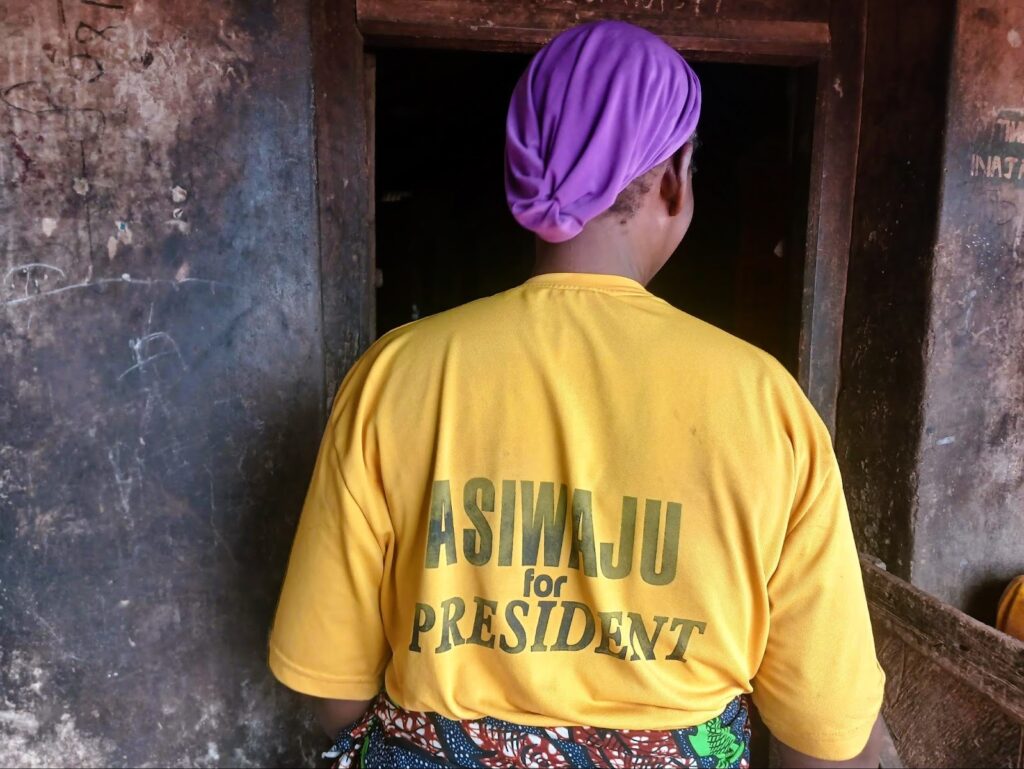
Adeniji Mariam’s burden is heavy, as well – feeding 12 kids, including orphans. “We’re surviving on God’s grace,” she said. Though once a staunch supporter of President Tinubu, the hardship experienced by her family has forced her to change her mind and regret campaigning for him.
“We thought he’d bring change, being a Yoruba man,” she admitted, “But now, we face unprecedented hardship. I can’t make any savings; it all goes to feeding. Poverty is real, and we’re living examples of it.”
The narrative focuses on the struggles of impoverished Nigerians, highlighting individuals ensnared in dwindling economic circumstances exacerbated by government policy changes and economic crises.
Ibrahim Rashidat is a physically challenged trader who, alongside caring for her incapacitated husband and five children, resorts to begging due to inadequate income. Silifat, an akara seller, and Kudirat, a construction laborer, both contend with increasing living costs, leading to relentless poverty and their children's school dropouts.
Kasali Moriliat and Adeniji Mariam also bear the burden of supporting families and communities amidst soaring expenses.
These stories are emblematic of a broader trend of escalating poverty in Nigeria, driven by factors such as subsidy removals, inflation, and insufficient government interventions, leaving citizens reliant on limited charitable programs.
Support Our Journalism
There are millions of ordinary people affected by conflict in Africa whose stories are missing in the mainstream media. HumAngle is determined to tell those challenging and under-reported stories, hoping that the people impacted by these conflicts will find the safety and security they deserve.
To ensure that we continue to provide public service coverage, we have a small favour to ask you. We want you to be part of our journalistic endeavour by contributing a token to us.
Your donation will further promote a robust, free, and independent media.
Donate HereStay Closer To The Stories That Matter





